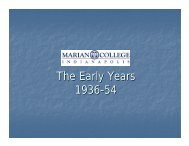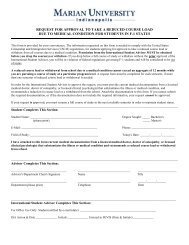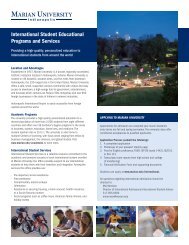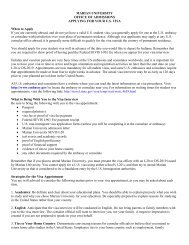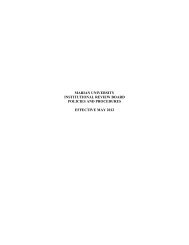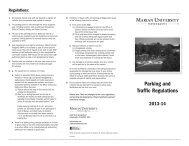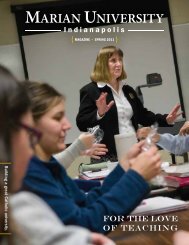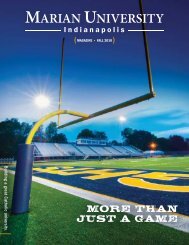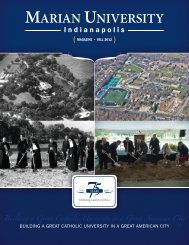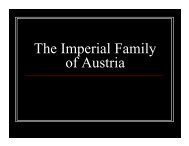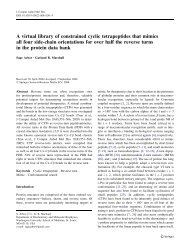2009-11 Marian University Course Catalog, fall 2010 edition
2009-11 Marian University Course Catalog, fall 2010 edition
2009-11 Marian University Course Catalog, fall 2010 edition
You also want an ePaper? Increase the reach of your titles
YUMPU automatically turns print PDFs into web optimized ePapers that Google loves.
School of Mathematics and Sciences<br />
The School of Mathematics and Sciences advances the<br />
mission of <strong>Marian</strong> <strong>University</strong> by providing a curriculum rich in<br />
opportunities to develop critical thinking and quantitative<br />
and numerate skills that can be used in contemporary<br />
situations. There are seven bachelor’s degrees, one associate<br />
degree, six concentrations, and four minor programs<br />
available in the areas of biology, chemistry, mathematics, and<br />
physics. The biology program also offers a bachelor degree<br />
that can lead to becoming a registered medical technologist.<br />
The chemistry program offers a degree in chemical<br />
technology that prepares students to become a research<br />
assistant or laboratory technician. Students may also pursue<br />
requisites for progress to a career in medicine or the health<br />
sciences.<br />
Teaching requirements: High school licensure is available in<br />
mathematics, chemistry, and biology. Students who wish to<br />
teach in a content area must meet all requirements for the<br />
chosen major field, and meet the School of Education’s<br />
developmental licensing requirements. Contact the School of<br />
Education for high school licensing program descriptions and<br />
specifics for each licensure area. All courses are subject to<br />
change based upon current requirements from the Division of<br />
Professional Standards, Indiana Department of Education.<br />
Mathematics Placement Test: All students who have scored<br />
less than 500 on the SATM or less than 19 on the ACTM are<br />
required to take the mathematics placement test. The results<br />
of the test are used to place students in the appropriate<br />
mathematics courses.<br />
BIOLOGY (BIO)<br />
For more information on biology programs, contact the Office<br />
of the Dean at 317.955.6331 or<br />
mathandscience@marian.edu.<br />
Major for Bachelor of Science Degree (B.S.) in Biology: To<br />
earn a B.S. degree in biology, a student must take: (1) 201,<br />
202, 203, 204, and 490; (2) at least 15 other credit hours in<br />
biology above 214; (3) CHE 305-306; (4) MAT 230; (5) one of<br />
courses: MAT 231 or PSY 205; and (6) and either PHY <strong>11</strong>0-<strong>11</strong>1<br />
or PHY 212. The student must complete at least 60 credit<br />
hours in mathematics (course numbers at or above 220) and<br />
sciences (BIO course numbers above 200, CHE course<br />
numbers above 150, and PHY course numbers at or above<br />
<strong>11</strong>0). Biology majors must earn a “C” or better in all biology<br />
courses that fulfill biology major requirements. Students who<br />
have not previously completed all the prerequisites for these<br />
courses will be expected to take those courses before<br />
beginning the required courses. In some cases, this may cause<br />
a student to take more than the normal four-years to<br />
complete the degree requirements.<br />
Major for Bachelor of Arts Degree (B.A.) in Biology: To earn a<br />
B.A. degree in biology, a student must take: (1) 201, 202, 203,<br />
204, and 490; (2) at least 15 other credit hours in biology<br />
above 214; (3) either CHE <strong>11</strong>0-<strong>11</strong>1 or CHE 151-152-305; and<br />
(4) either PHY <strong>11</strong>0-<strong>11</strong>1 or PHY 212. Biology majors must earn<br />
a “C” or better in all biology courses that fulfill biology major<br />
requirements. Students who have not previously completed<br />
all the prerequisites for these courses will be expected to<br />
take those courses before beginning the required courses. In<br />
some cases, this may cause a student to take more than the<br />
normal four-years to complete the degree requirements.<br />
Concentrations in Biology: Depending on the courses<br />
selected, a student may earn either a Bachelor of Arts (B.A.)<br />
or Bachelor of Science (B.S.) in Biology within the chosen<br />
concentration.<br />
Concentration in Bioinformatics: 415, 440, CHE 3<strong>11</strong>, CHE 312,<br />
MAT 231, and MAT 310. The student must also take at least 6<br />
credit hours from: 410, 498, CHE 435, MAT 305, MAT 315,<br />
and MAT 430.<br />
Concentration in Cell and Molecular Biology: 410, 415, CHE<br />
3<strong>11</strong>, and CHE 312. The student must also take at least 7 credit<br />
hours from: 340, 345, 398, 440, 498, CHE 380, CHE 480, and<br />
MAT 430.<br />
Concentration in Ecology and Environmental Science: BIO 320<br />
or 327. The student must also take at least 20 credit hours<br />
from: 260, 270, 305, 320,321, 323, 327, 328, 360, 361, 372,<br />
374, 355, 398, 415, 425, 460, 462, 463, 465, 498, CHE 270,<br />
315, 420, and ECN 310. Students completing this<br />
concentration may substitute CHE 270 for CHE 306 to<br />
partially fulfill the chemistry requirements for the B.S. Biology<br />
degree. If this substitution is made, CHE 270 does not count<br />
toward the required credits for the concentration.<br />
Concentration in Exercise Physiology: 251, 252, 334, and 434.<br />
The student must also take at least 15 credit hours from: 226,<br />
410, 415, 499, CHE 3<strong>11</strong>, CHE 312, ESS 340, ESS 355, and NUR<br />
238.<br />
Concentration in Human Biology: 225, 252, 226 or 334, and<br />
THL 316. The student must also take at least 15 additional<br />
credit hours from: 251, 260, 320, 330, 340, 345, 350, 370,<br />
410, 415, 434, 498, 499, CHE 270, CHE 310 or CHE 3<strong>11</strong>-312,<br />
NUR 200, NUR 231, NUR 238, PSY 220, PSY 330, PSY 350, and<br />
SOC 335.<br />
Major for Bachelor of Science (B.S.) Degree in Clinical<br />
Laboratory Science (Medical Technology): The clinical<br />
laboratory science program leads to the B.S. degree in biology<br />
and to eligibility for certification as a medical technologist.<br />
The first three years (98 credits) are based on the degree<br />
program in general education, basic science, and biology<br />
major requirements. The fourth year (at least 30 credits of<br />
400-level courses) is spent in a 12-month program at a center<br />
accredited by the American Medical Association, and<br />
approved by <strong>Marian</strong> <strong>University</strong>. Presently, the university has<br />
affiliation agreements with St. Francis Hospital and Health<br />
Centers and Methodist Hospital in Indianapolis.<br />
The <strong>Marian</strong> <strong>University</strong> clinical laboratory science program<br />
requirements include 26 credits of biology (150, 260, 270,<br />
59



